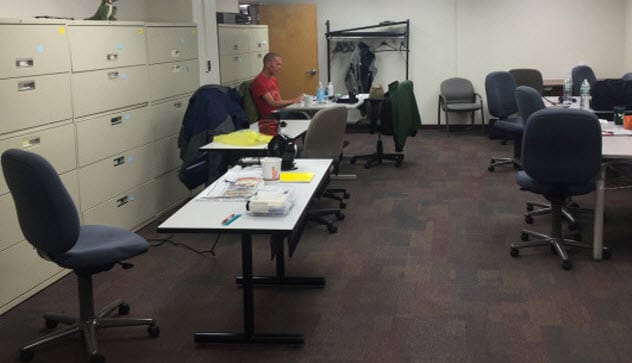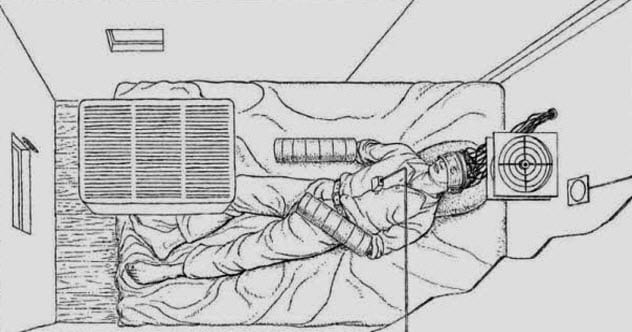 Music
Music  Music
Music  History
History 10 Less Than Jolly Events That Occurred on December 25
 Weird Stuff
Weird Stuff 10 Funny Ways That Researchers Overthink Christmas
 Politics
Politics 10 Political Scandals That Sent Crowds Into the Streets
 Weird Stuff
Weird Stuff Ten Bizarre Facts About The Doge Meme
 Our World
Our World 10 Ways Your Christmas Tree Is More Lit Than You Think
 Movies and TV
Movies and TV The 10 Coolest Stars to Set Sail on The Love Boat
 History
History 10 Things You Didn’t Know About the American National Anthem
 Technology
Technology Top 10 Everyday Tech Buzzwords That Hide a Darker Past
 Humans
Humans 10 Everyday Human Behaviors That Are Actually Survival Instincts
 Music
Music 10 Surprising Origin Stories of Your Favorite Holiday Songs
 History
History 10 Less Than Jolly Events That Occurred on December 25
 Weird Stuff
Weird Stuff 10 Funny Ways That Researchers Overthink Christmas
Who's Behind Listverse?

Jamie Frater
Head Editor
Jamie founded Listverse due to an insatiable desire to share fascinating, obscure, and bizarre facts. He has been a guest speaker on numerous national radio and television stations and is a five time published author.
More About Us Politics
Politics 10 Political Scandals That Sent Crowds Into the Streets
 Weird Stuff
Weird Stuff Ten Bizarre Facts About The Doge Meme
 Our World
Our World 10 Ways Your Christmas Tree Is More Lit Than You Think
 Movies and TV
Movies and TV The 10 Coolest Stars to Set Sail on The Love Boat
 History
History 10 Things You Didn’t Know About the American National Anthem
 Technology
Technology Top 10 Everyday Tech Buzzwords That Hide a Darker Past
 Humans
Humans 10 Everyday Human Behaviors That Are Actually Survival Instincts
Top 10 Ways People Got Paid To Do Nothing
Do you ever dream that you could be paid to do nothing? Instead of being held down by a job, you could read books or surf the web as much as you wanted. Sound impossible?
Well, sometimes, the fates align in such a way that people actually end up making money for doing little more than existing. Let’s count down 10 different ways that people have made money for doing next to nothing.
10 Paid To Stand In Line

Nobody likes waiting in line, but what if you could make money by holding someone’s spot? It may sound crazy, but it might make good economic sense.
In Italy, for example, the bureaucracy is so thick at government agencies that the average Italian spends about 400 hours per year waiting in line, which wastes the equivalent of an estimated $44 billion of total productive time. This occurs because many in the country prefer to pay in cash, resulting in fewer online transactions and longer processing times.
The solution for some is to hire a codista (“queuer”) as in someone who waits in line for you. These professionals will do things such as pay bills, mail packages, and navigate government departments. This job has become common enough that there is now a standard contract and insurance package charged to the client, just in case the codista has an accident while waiting in line.[1]
To find others who do this, look no further than New York City. There, you can find professional line-sitters who specialize in waiting for concert tickets, an appointment at the Department of Motor Vehicles, or limited-release sneakers. Let’s just hope that these line-sitting services don’t explode in popularity or else you’ll need to hire someone to wait in line to hire someone to wait in line.
9 Paid To Lie In Bed For Months Straight

We all have days when we consider staying in bed instead of getting up to greet the day. But what if your job was to stay in bed?
Researchers sometimes pay people to lie in bed for long periods of time to study what happens to their bodies. NASA has done this many times for over a decade. It may be nice at first to get paid to relax in bed, but according to someone who has done it, you’ll come across some problems. Being in such a study restricts your ability to shower, use the bathroom, eat, and navigate other basic needs.
You won’t be simply lying still and doing whatever you want for the entire time, either. For studies such as these, you’ll need to participate in various measurements, meaning that medical staff will be poking you with instruments frequently. There may also be painful procedures, such as shocks to your muscles. So it’s up to you whether you are willing to take that lying down.[2]
France recruited people for a similar program in 2017. Those individuals had to keep at least one shoulder in contact with their bed at all times for 60 days. Participants were offered the equivalent of a little over $17,000 for this study. This wasn’t merely a repeat of old research: Some participants were given a cocktail of drugs to try to prevent some of the negative long-term effects, such as insulin resistance.
8 Paid To Wait In A Reassignment Center

In some school districts, teachers accused of misconduct are not immediately fired or sent home from their jobs. Instead, they are reassigned into an unusual situation where they continue to collect their pay while not being allowed to work. However, they are still required to show up.
These teachers often sit in rooms—referred to as “rubber rooms” or “reassignment centers”—and do almost nothing during what would normally be work hours. In multiple places, including New York City, school employees often wait years for their legal hearings to proceed. Spending two, three, or more years in this situation is not uncommon.
Reportedly, New York also has rubber rooms for corrections officers, where they work modified duties such as guarding empty jail cells while continuing to be paid. New York officials claim that people in rubber rooms are given administrative tasks to keep them busy, but investigations and photos revealed much downtime and napping instead.[3]
The rubber rooms are notoriously hard to eliminate due to laws that make it difficult to fire some employees. There have been multiple attempts to fix the situation in New York.
A school district in Los Angeles successfully got rid of their rubber rooms after a change in policy. Instead, some teachers who formerly reported to rubber rooms now collect their regular paychecks in the comfort of their own homes while they wait for the charges against them to be settled.
7 Paid To Not Wrestle

It is common for wrestlers to take time off from the ring, whether due to an injury or because nobody can put that much physical strain on his body every day of the month. Sometimes, high-profile wrestlers work only a few days in a year, saving their appearances for high-profile shows and spending the rest of their time staying in shape.
For example, The Undertaker, one of the highest-profile wrestlers in the WWE, often goes months or years without a match. In such cases, companies will often pay these wrestlers to keep them retained for future performances.
What is unusual is the case of Lanny Poffo, who signed multiple years of contracts with World Championship Wrestling (WCW) back in the 1990s. Poffo was a talented wrestler who performed under other monikers in the past, including the name “The Genius.”
He was also the brother of “Macho Man” Randy Savage, which Poffo says helped him get the contract in the first place. But from 1995 to around 1999, he never wrestled a single match for the WCW despite being paid and under contract with them.
In a later interview, Poffo claimed that he kept himself in physical shape and waited for the phone to ring to tell him that he was needed in the ring, but that day never came. WCW was reportedly paying Poffo an enormous sum of money for his zero appearances. By one report, the amount was $150,000 per year. WCW later collapsed as a company.[4]
6 Paid Despite Never Showing Up To Work At Government Offices

Imagine if you were paid a regular salary for a decade without ever showing up to work. In Kuwait, a recent investigation into the attendance of government employees revealed over 900 with “irregular attendance” who were then suspended.
One of those had apparently never shown up to work in the first place. His absence was not noticed until the country cracked down on the attendance problem that has been around for a while.[5]
Back in 2011, Kuwait released an official report that showed only half of all public employees were showing up to work as expected. Reportedly, conditions in public sector jobs in Kuwait and other Gulf Coast countries are not very demanding, and many people receive a salary for doing nothing.
The governments of these countries are working to change this. But one problem is that people are used to these easy government jobs and do not want to enter the private sector where they would need to work long hours and compete with others. As things are now, so many people are employed without accomplishing real work that these workers have been described by one news outlet as a “ghost army.”
Kuwait recently implemented a policy that required public employees to physically scan their fingers on a biometric reader in their workplaces each day. In response, thousands of people quit because they were worried they would get caught for breaking attendance rules.
The ruler of Dubai made headlines in 2016 when he showed up unannounced to multiple government offices and discovered many people were skipping work. Talk about a bad day to skip out.
5 Paid To Have A Truck

A scandal from 2004 in Chicago saw large numbers of truck companies getting paid big bucks for little or no work. An investigation by the Sun-Times revealed that owners of entire fleets of trucks, including dump trucks and construction-related vehicles, were being paid millions of dollars over several years to mostly just have their vehicles sit around.
Reporters from the Sun-Times followed some of these trucks to see what they were really doing during the hired time. Over multiple days, they saw many dump trucks do nothing but hang out at some city work sites. They also saw a hired truck visit a restaurant and a store before eventually taking on a small load for hauling.
While it isn’t entirely uncommon for vehicles to be hired and not fully used, what was unusual in this case was that these private trucks did not compete in bids. The mayor’s budget department simply decided who got paid through the program without contracts.
It was revealed that bribes were changing hands between the truck companies and city officials, which led to a federal investigation. Some truck companies had connections to the mob. Eventually, 48 people went to prison over the scandal when it was revealed that this dump truck hiring scheme was a total load of garbage.[6]
4 Paid To Frustrate French Bureaucrats

When you upset your boss at your job, he may try to get revenge whether or not he finds a legal way to do so. But what if your boss’s revenge came in the form of paying you not to work for over a decade? In France, rail operator Charles Simon was paid 5,400 euros a month for 12 years despite doing no rail work due to a falling-out with his employer.
According to Simon, he was a whistle-blower in an alleged false invoice fraud at his company that totaled millions of euros. He did what any loyal employee would do and reported the fraud to his bosses. At that point, he was removed from his post and told that he was going to be assigned elsewhere.
But that never happened. Instead, he was railroaded into doing nothing. Due to complex French labor laws, his old job status was protected. While waiting to begin his new job that never came, he was still receiving regular paychecks. His story made headlines in 2015 when he sued his employer for ruining his career.
Simon’s story is not unique in France. A man named Bosko Herman also spent over a decade not working while being paid a salary every month by the French government. Herman worked at a town hall for five years before having a personal disagreement with the mayor.
Herman was relieved of his position but not truly fired due to a legal clause that allowed a civil servant to continue to collect payments until he had a new job. Despite sending off dozens of job applications, he was never hired elsewhere and continued to be paid by the government.[7]
3 Paid To Do Nothing In Isolation . . . As Long As You Can Stand It

In the 1950s, researchers were interested in the effects of boredom. Scientists created experiments designed to isolate people and make them as bored as possible. One study was described by a researcher as “too cruel to do with animals, but not with college students.”
The good news is that the students were paid 24 hours a day to participate in the experiment. The bad news was what the study involved: prolonged and torturous monotony.
The participants were kept on beds in small enclosed spaces. They wore special glasses that blocked some vision, sponges in their ears, gloves on their hands, and cardboard cuffs on their wrists. Thus, they were deprived of much of their vision, hearing, and touch. An air conditioner was running to drown out other noises, and the participants had microphones if they needed to communicate.
These individuals were allowed to leave to use the bathroom, and they usually ate their meals while sitting on the edge of their beds. Besides that, they were on their own—with only their thoughts for company.
At first, the participants reported thinking about normal things, such as their personal problems and their studies. Some counted numbers in their heads to pass the time. After a while, they began to be unable to concentrate on anything in particular and reported having “blank periods” when they were not thinking much at all. Eventually, they hallucinated.
The hallucinations often began as simple lights or geometric patterns before evolving into wild fantasies. One person described seeing a “procession of squirrels with sacks over their shoulders.” Reportedly, the visions began to grow more disturbing and vivid over time until they interfered with sleep.[8]
One participant reported that “something seemed to be sucking my mind out through my eyes.” These individuals were paid $20 per day, which is the equivalent of around $190 dollars today. They were allowed to stay as long as they liked.
2 Paid To Sleep Or Stay Awake

Researchers are constantly looking for people to participate in paid sleep studies, which are what they sound like. You get paid to sleep while you are observed by researchers either directly or via body-monitoring devices.
Harvard Medical School maintains a website where they list sleep studies for which they are recruiting. While some of them require specifics, such as certain body types or diseases, others merely request that you are someone who sleeps and wants money.
For example, one woman participated in sleep research and earned around $12,000 for a total of 11 nights of “work.” In 2017, she wrote about her experiences and reported that some of the weirder elements of the study included medical tests before, during, and after the sleeping. At various points, she had an IV, electrodes on her head, and an attached rectal thermometer.
Speaking of uncomfortable things, you may be required to maintain certain sleep postures or snooze in a way that you’re not used to. So, maybe you’ll need to practice sleeping before you sign up.[9]
But be careful what you sign up for! It may pay well, but be sure to read the description of what you’ll actually be doing. For example, researchers also use these studies to study sleep deprivation.
One study had participants spend 20 days on a modified sleep schedule where they were only allowed to sleep for a bit over four hours at a time. After the experiment, these individuals were also paid for five “recovery days” where they were allowed to sleep up to 10 hours per night.
Presumably, the participants took the researchers up on these recovery days and slept like logs. Who knew sleep studies could be so exhausting?
1 Paid To Watch TV In An Empty Care Home

In 2014, a care home in New Jersey was closing and hundreds of workers were supposed to be laid off or reassigned to other facilities. The home normally provided services to over 200 people with developmental disabilities who lived in cottages on the property.
However, all these people had been gradually moved to other facilities. Even so, many employees continued to show up to work. They played cards and watched television in the cottages while collecting their paychecks. A report issued about this incident estimated that millions of dollars were paid to idle employees.
This strange case occurred because of a few errors. It is normal in New Jersey for some employees in civil service roles, such as care home workers, to receive pay during a layoff period so that they can decide on new jobs.
However, in this case, the state of New Jersey applied for an extension of the layoff period, resulting in 147 days of guaranteed work and payment for the employees during the layoff process. This happened before there was any evidence that the layoff would actually take that long.
Additionally, bookkeeping errors were made when it came to adjusting the wage differential of the night-shift employees. They were paid extra money even though they no longer worked nights.
Some workers were given the option of starting their new jobs at other locations early. But most of them didn’t because they were still being paid to “work” at the old location. This was unfortunate because other care home locations reportedly needed help, and it seems that the care workers weren’t paid enough to care.[10]
Alexander R. Toftness runs a science and history channel at https://www.youtube.com/artexplains and can be found on Twitter @ARTexplains for more strange facts.
Read about more strange jobs on Top 10 Strangest Jobs In History and 10 Quirky Ways People Make Money.








